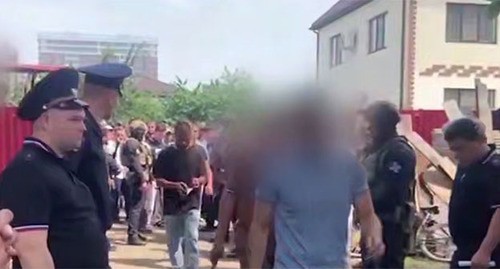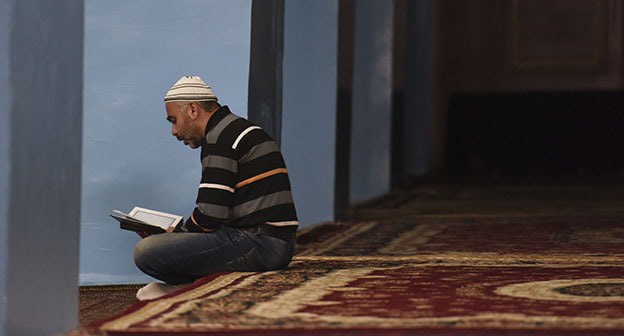Muslims of Krasnodar Region Called the Problem with Places for Prayer Unsolvable
There is no official mosque in Krasnodar, prayer houses are under pressure, and believers are forced to perform namaz in cafes and at gas stations, Muslims of the Krasnodar Territory said. In their opinion, this is a manifestation of discrimination against Muslims.
As "Kavkazsky Uzel" wrote, according to law enforcement officials, a prayer room in a gardening association on Zapadnaya Street in Krasnodar was operating with violations, and its leader was charged with administrative violations under the article on illegal missionary activity. In addition, illegal places of "Muslim religious rites" were discovered in the village of Varenikovskaya in the Krymsky District, in the Khorin farm, and the villages of Mayak and Podgornaya Sinyukha in the Otradnensky District, according to a publication on the department's official Telegram channel.
There are no mosques in Krasnodar, although there are more than 10 thousand Muslims in the city. The Yandex.Maps service contains information about the Islam na Kubani mosque on Zapadnaya Street in the garden association No. 13 of the Sedin plant in Krasnodar, the closure of which was reported by security forces on June 16.
There is no functioning mosque or official prayer room in Krasnodar. Moreover, according to the believers themselves, Muslims are not only deprived of the opportunity to openly practice their religion, but are also subject to administrative pressure, closure of prayer houses, threats of demolition of private property and criminal prosecution.
A ban on prayers in a two-story house on a garden plot in Krasnodar, converted into a prayer house, deprived hundreds of Muslims of a place to perform namaz. People are forced to pray outside or secretly in cafes, gas stations, and even public toilets where there is water. According to the decision of the Prikubansky District Court of Krasnodar dated December 12, 2023, the building was recognized as an unauthorized construction, and the administration's claim for its demolition was satisfied. After the initiation of enforcement proceedings (No. 165308-24-23041-IP) on February 29, 2024, the house was closed, and the proceedings were completed on March 29, 2024. Thus, one of the few places for prayer in Krasnodar has been outlawed, the "Caucasian Knot" correspondent reports.
People pray in cafes, at gas stations, in the back rooms of stores
 "Many are afraid to speak out. We have two or three prayer houses, and if we start complaining, they can be closed. People pray in cafes, at gas stations, in the back rooms of stores. But all this is not an alternative to a full-fledged mosque," one of the Novorossiysk entrepreneurs, Zamir, told a "Caucasian Knot" correspondent.
"Many are afraid to speak out. We have two or three prayer houses, and if we start complaining, they can be closed. People pray in cafes, at gas stations, in the back rooms of stores. But all this is not an alternative to a full-fledged mosque," one of the Novorossiysk entrepreneurs, Zamir, told a "Caucasian Knot" correspondent.
According to Alexander Nasyrov, who headed a Muslim organization in Novorossiysk for more than 10 years, about 180 thousand Muslims, but there is a critical shortage of places for prayer.
On the community's website, Muslims publish information about the time and place of prayer. But this method of communication also works, as the interlocutors emphasized, "at your own risk."
"Every Muslim must perform namaz - prayer - five times a day. To do this, you need to take off your shoes, perform ablution (wash your hands, face, feet), lay out a prayer rug, turn towards Mecca and read the obligatory prayers. Cleanliness, peace, silence, a warm room are required. In bad weather, praying in the open air is not just humiliating, it is a direct threat to health. But this is how it happens in Krasnodar," a former member of the liquidated religious organization of Muslims of the Krasnodar Territory Ashuram told a "Caucasian Knot" correspondent.
According to him, the holiday prayers on Eid al-Adha and Eid al-Fitr are important collective rituals, but their implementation in the region is difficult. "There are no places, access is limited, people are afraid of the consequences. They go to other cities or perform rituals at home behind high fences. We are all citizens of Russia, but for some reason we are not equal to other Russians, non-Muslims, and we regard this as discrimination on religious grounds," he said.
Eid al-Adha is a holiday of sacrifice in memory of the Prophet Ibrahim's decision to sacrifice his son. It falls on the tenth day of the month of Dhul-Hijjah, which marks the end of the Hajj pilgrimage to Mecca. The meat of animals sacrificed during Eid al-Adha is traditionally served to the poor, as well as relatives and friends.
The organization led by Rashid Shazzo in Krasnodar was liquidated by the Ministry of Justice in 2023, due to formal violations in documentation. After that, according to Ashuram,the "systematic destruction of all places where Muslims could pray" began.
All actions - the demolition of houses of worship, bans, raids and persecution - are a form of discrimination based on religion
A Muslim lawyer, speaking on condition of anonymity, agreed that discrimination against Muslims based on religion is observed in the Krasnodar region. "All actions - demolition of houses of worship, bans, raids and persecution - are a form of discrimination on the basis of religion, which contradicts the Constitution of the Russian Federation (Article 28), the law "On Freedom of Conscience and Religious Associations" (Federal Law No. 125) and Russia's international obligations under Article 18 of the International Covenant on Civil and Political Rights. But everything happens behind the scenes, and people are afraid to defend their rights," he told a "Caucasian Knot" correspondent.
According to the lawyer, each case, like in Krasnodar, should be considered individually in court, but Muslims are often denied full legal protection, and lawyers are afraid to take on such cases, considering them politically dangerous.
Problems are also arising in other regions, said the former head of the transport organization, now a truck driver Abdurashid Samadov.
"In "Food City" in Moscow - a place where there are thousands of Muslim workers - there is not even a prayer room. I transport cargo there from all over Russia. Last year, my son and I prayed there with the permission of the general director, but his security called the police and provoked a conflict, and we were jailed for 10 days for "petty hooliganism," he told a "Caucasian Knot" correspondent.
He also said that a prayer room was equipped at one of the gas stations on the Rostov-on-Don - Moscow highway. Soon the owner of the gas station had to close it after a visit police.
MMuslims are not only natives of the Caucasus. Islam is practiced by Tatars, Bashkirs, as well as people from Uzbekistan, Tajikistan, Turkmenistan and a number of African countries, recalled Alexander Nasyrov. According to him, according to various estimates, 20 to 25 million Muslims live in Russia. And in the Krasnodar Territory, according to estimates from 10 years ago, there are more than 180,000 of them, he said.
Ashuram believes that the tone of hostility towards Muslims in the region was set by the former governorAlexander Tkachev (Minister of Agriculture of the Russian Federation (2015-2018), head of the administration Krasnodar Krai (2001-2015), — note from "Caucasian Knot"). "He said that Catherine II populated this land with Cossacks, and that the Caucasian War "put everything in its place." From this it followed: Muslims have no place here. But before, these lands — from Sochi to Adygea — belonged to the Circassian peoples, and Islam has been practiced here for centuries,” he said.
On August 2, 2012, at a board meeting of the Main Directorate of the Ministry of Internal Affairs of Russia for Krasnodar Krai, Tkachev gave a speech explaining the need to create Cossack squads in Kuban. “We have no other way — we will squeeze them out, restore order, ask for documents, engage in migration policy… The Kuban people are here, they have their own laws, they are pretty tough guys here,” the head of the region said, in particular. In particular, he called on representatives of the “Caucasian peoples” to “squeeze them out” of the region. Kuban police did not find signs of extremism in these words.
Against the backdrop of the lack of official prayer places, pressure on religious organizations and the fear of Muslims to speak out publicly, the situation in the Krasnodar Territory is causing serious concern among Muslims. They believe that the situation "needs legal and public understanding," the lawyer emphasizes.
We have updated the applications on Android and IOS — now they work without VPN! We would be grateful for criticism, ideas for development both in Google Play/App Store and on KU pages in social networks. Without installing a VPN, you can read us in Telegram (in Dagestan, Chechnya and Ingushetia — with VPN) or use the browser Ceno to bypass blocking. Via VPN, you can continue reading "Caucasian Knot" on the website as usual, and on social networks: Facebook*, Instagram*, "VKontakte", "Odnoklassniki" and X. You can watch "Caucasian Knot" videos on YouTube. Send messages to WhatsApp* to +49 157 72317856, to Telegram to the same number, or write to @Caucasian_Knot.
* Meta (which owns Facebook, Instagram, and WhatsApp) is banned in Russia.
Translated automatically via Google translate from https://www.kavkaz-uzel.eu/articles/412709





![Tumso Abdurakhmanov. Screenshot from video posted by Abu-Saddam Shishani [LIVE] http://www.youtube.com/watch?v=mIR3s7AB0Uw Tumso Abdurakhmanov. Screenshot from video posted by Abu-Saddam Shishani [LIVE] http://www.youtube.com/watch?v=mIR3s7AB0Uw](/system/uploads/article_image/image/0001/18460/main_image_Tumso.jpg)